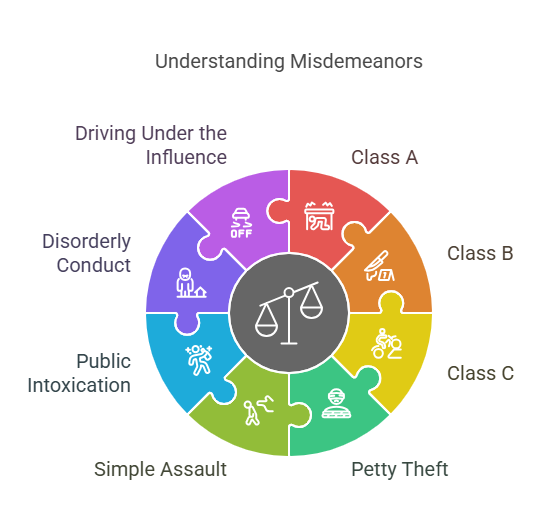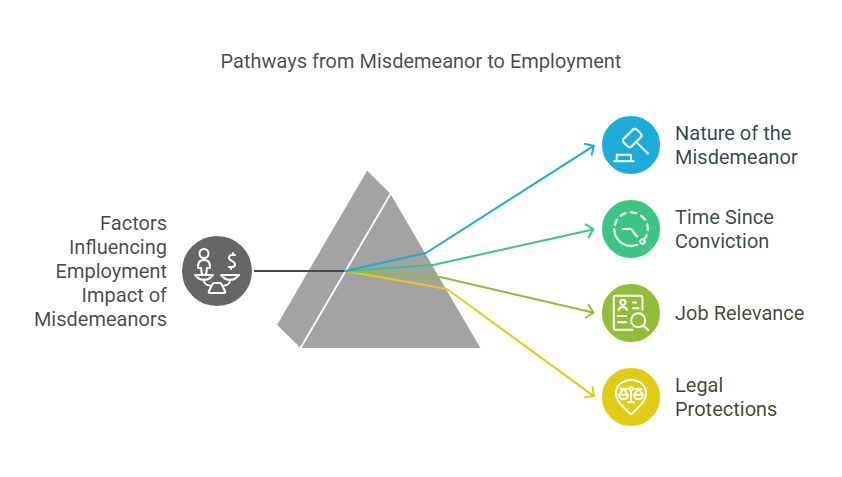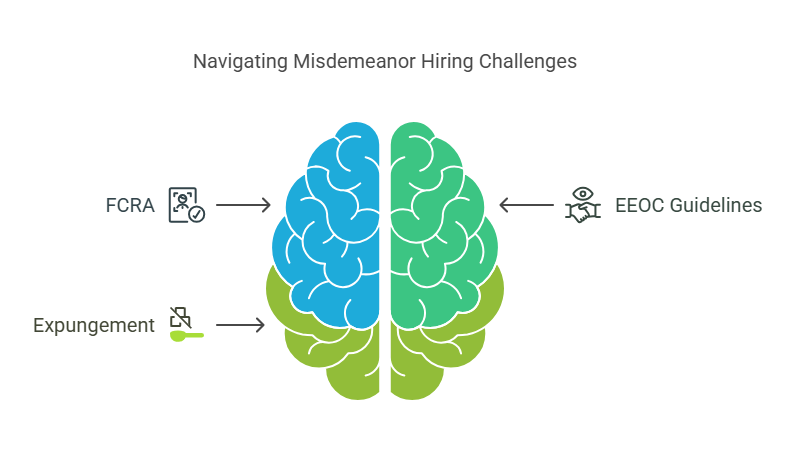Can a Misdemeanor Prevent you from Getting Hired?

Introduction and General Overview
When it comes to job hunting, one common concern for many individuals is whether a misdemeanor will affect their ability to secure employment. Criminal records can present challenges during the hiring process, and misdemeanors, which are typically less severe than felonies but still represent criminal behavior, are no exception. In this article, we’ll delve into how a misdemeanor can impact job prospects, explore the general hiring practices regarding criminal records, and discuss how different industries may treat applicants with a misdemeanor charge on their record.
What is a Misdemeanor?

A misdemeanor is a criminal offense that is less severe than a felony but still carries legal consequences. Misdemeanors are generally categorized as low-level offenses, and the penalties often include fines, probation, or a short-term jail sentence. They are typically classified into three categories: Class A, Class B, and Class C, with Class A being the most serious of the misdemeanors.
Some common examples of misdemeanor offenses include:
- Petty theft: Stealing items of relatively low value.
- Simple assault: A physical altercation where no serious harm was inflicted.
- Public intoxication: Being visibly drunk or intoxicated in public.
- Disorderly conduct: Behaving in a disruptive manner in public spaces.
- Driving under the influence (DUI): Operating a vehicle while impaired, often by alcohol or drugs.
While these offenses may not carry as severe consequences as felonies, they can still affect an individual’s future, especially when it comes to employment.
How Employers View Misdemeanors During Employment Screening
Employers generally conduct background checks as part of the hiring process to ensure they are hiring trustworthy, responsible individuals. When a misdemeanor appears on a background check, it can influence an employer’s hiring decision, but the impact depends on several factors.
Employers may consider the following aspects when evaluating an applicant with a misdemeanor record:
- Relevance to the job: Employers are more likely to overlook a misdemeanor if the charge has no bearing on the responsibilities of the job. For example, a misdemeanor related to public intoxication may not be a concern for a desk job, but it could be an issue for positions that involve operating machinery or driving.
- Time elapsed since the conviction: A misdemeanor that occurred many years ago and has not led to further criminal behavior may be less of an obstacle for employers than a recent offense.
- Severity of the misdemeanor: Violent misdemeanors, such as simple assault, may be scrutinized more heavily than non-violent offenses like petty theft.
It’s essential to understand that each employer has its own policies and guidelines regarding criminal records. However, many are open to giving applicants with misdemeanor records a chance, especially if the applicant has demonstrated remorse or has shown that they have reformed.
Impact of a Misdemeanor on Various Industries
The effect of a misdemeanor on employment prospects can vary greatly depending on the industry. Below is a breakdown of how a misdemeanor might affect hiring decisions in different sectors:
- Education: Schools and educational institutions generally have strict policies regarding criminal background checks, especially for positions that involve direct interaction with students. A misdemeanor related to violence or sexual offenses may disqualify an applicant, but non-violent offenses may be overlooked depending on the circumstances.
- Healthcare: For healthcare positions, a misdemeanor related to substance abuse or violence may raise concerns about the individual’s ability to perform the duties of the job safely and ethically. However, non-violent misdemeanors that are unrelated to healthcare responsibilities may not have as significant an impact.
- Finance: Financial institutions often conduct thorough background checks due to the sensitive nature of the work. Misdemeanors related to theft, fraud, or dishonesty could be problematic for applicants seeking employment in this sector. However, misdemeanors unrelated to financial crimes may have less of an impact.
- Retail and Customer Service: In customer-facing industries like retail and customer service, employers are likely to focus more on how the misdemeanor impacts the applicant’s reliability, behavior, and ability to interact with customers. Minor offenses or older convictions may not significantly affect an applicant’s chances in these industries.
- Government and Law Enforcement: Certain government positions, especially those requiring security clearance or direct interaction with vulnerable populations, may have more stringent background check requirements. A misdemeanor, particularly one involving dishonesty or violence, could disqualify an applicant for these roles.
Factors That Influence Whether a Misdemeanor Will Affect Employment

- The Nature of the Misdemeanor ChargeOne of the most significant factors is the nature of the misdemeanor itself. Misdemeanors can vary widely in terms of severity, and employers often differentiate between violent and non-violent offenses. A violent misdemeanor, such as assault, may raise concerns for employers, particularly those hiring for positions involving direct interaction with others. Non-violent offenses, like disorderly conduct or petty theft, may be viewed less negatively, especially if they occurred years ago.
- Violent misdemeanors: These include offenses like simple assault, battery, or domestic violence. Such charges may prevent applicants from being hired for positions that involve physical interaction, caregiving, or security work.
- Non-violent misdemeanors: These might include public intoxication, trespassing, or minor theft. While these charges are still criminal, employers may be more lenient, especially if the applicant has shown rehabilitation.
- Time That Has Passed Since the ConvictionAnother crucial factor is the time elapsed since the conviction. Employers are less likely to be concerned about a misdemeanor charge that occurred many years ago if the applicant has demonstrated stability, responsibility, and good character since then. If the misdemeanor happened recently or is part of a pattern of criminal behavior, it may raise more concerns for employers.Many employers may ask applicants about their criminal history but may give more weight to the age of the conviction. For example, a misdemeanor charge from 10+ years ago may not have the same impact as one from a few months ago. This is particularly true if the applicant has since rehabilitated, avoided further legal issues, and gained employment without incident.
- Relevance to the Job Being Applied ForThe relevance of the misdemeanor to the job being applied for is another crucial factor. Employers typically assess whether the nature of the offense could affect the applicant’s ability to perform the job’s duties. For instance:
- Customer service roles: A misdemeanor related to public intoxication or disorderly conduct may not disqualify an applicant unless they are applying for a role that involves direct interaction with customers in sensitive settings.
- Security or law enforcement positions: For jobs requiring high levels of trust and security, such as those in law enforcement, government positions, or roles that require a security clearance, a misdemeanor involving dishonesty or violence may significantly affect the hiring decision.
- Healthcare or education: Misdemeanors related to substance abuse or violence may be problematic for positions in healthcare or education due to the sensitive nature of these jobs and the need for reliable, responsible employees.
- Ban-the-Box Laws and Other Legal ProtectionsVarious ban-the-box laws across states and municipalities prohibit employers from asking about criminal history on job applications. Instead, employers are often required to wait until later in the hiring process, such as after a conditional offer of employment, before requesting background checks. This can help reduce discrimination against applicants with a criminal record, including misdemeanors.These laws aim to give individuals with criminal records a fairer chance to be evaluated based on their qualifications and not automatically dismissed due to a past conviction. Additionally, Equal Employment Opportunity Commission (EEOC) guidelines provide a framework for employers to consider criminal records in hiring decisions, ensuring they don’t discriminate against individuals based on race, national origin, or other protected classes.
Furthermore, in certain cases, employers are prohibited from asking about minor convictions, especially if the crime is irrelevant to the job. This could allow applicants with misdemeanor charges that do not relate to their job responsibilities to be considered for employment opportunities more equitably.
How Exact Background Checks Can Help
At Exact Background Checks, we specialize in providing employers and individuals with accurate, reliable, and compliant criminal background screening services. Our platform assists businesses in navigating the complexities of hiring practices, ensuring that the criminal history of applicants is thoroughly evaluated and in accordance with relevant laws.
For employers, we offer background checks that:
- Ensure compliance with federal and state laws, including ban-the-box and EEOC guidelines.
- Provide clear and concise reports on criminal history, including misdemeanor convictions.
- Allow employers to make informed hiring decisions while protecting the privacy and rights of applicants.
For job applicants, we provide the opportunity to better understand what will appear on their background check and guide them through the process of obtaining expungements if applicable. We work to ensure that both employers and job seekers have access to accurate, fair, and up-to-date criminal history information, enabling smoother and more transparent hiring decisions.
Possible Outcomes of a Misdemeanor Charge in Different Industries
Below is a summary of how a misdemeanor charge might impact employment prospects across various industries:
| Industry | Possible Outcomes for Misdemeanors |
|---|---|
| Education | Misdemeanors related to violence or sexual offenses may disqualify applicants. Non-violent charges may be less of an issue. |
| Healthcare | Misdemeanors related to substance abuse or violent behavior may be problematic. Non-violent offenses may have less impact. |
| Finance | Misdemeanors related to theft, fraud, or dishonesty could be disqualifying, particularly for roles involving financial oversight. |
| Retail and Customer Service | Less likely to be impacted unless the offense is directly related to the job role, such as public intoxication or theft. |
| Government and Law Enforcement | Violent or dishonest misdemeanors could disqualify applicants, especially for positions requiring security clearance. |
Legal Aspects of Hiring Individuals with a Misdemeanor

- The Fair Credit Reporting Act (FCRA)The Fair Credit Reporting Act (FCRA) governs the way employers use background checks, including criminal history, during the hiring process. According to the FCRA, employers must obtain written consent from applicants before conducting a background check. Additionally, if an employer decides not to hire an applicant based on information in their background check, they are required to provide a pre-adverse action notice, allowing the applicant to dispute any inaccuracies.The FCRA also mandates that background checks should be fair, and employers should not make decisions solely based on an applicant’s criminal history unless the conviction is relevant to the job. This ensures that applicants are given a fair chance to be evaluated based on their qualifications and experience.
- The Equal Employment Opportunity Commission (EEOC) GuidelinesThe EEOC has issued guidelines that employers must follow when considering criminal history as part of their hiring process. According to the EEOC, employers should evaluate criminal records individually and in the context of the job in question. They are also prohibited from using blanket policies that automatically disqualify applicants with criminal records.The guidelines emphasize that discriminatory practices should be avoided. Employers cannot discriminate against candidates based on race or national origin, as criminal record rates vary among different demographic groups. For instance, if a policy automatically disqualifies candidates with certain misdemeanor convictions, it could potentially lead to disparate impact discrimination, violating federal law.
- Expungement and Sealing of Misdemeanor RecordsMany states offer the option to expunge or seal misdemeanor records, allowing individuals to move forward without the stigma of a criminal conviction. The expungement process involves petitioning the court to remove certain misdemeanor charges from public records, effectively erasing the conviction. In most cases, expunged records are not visible to employers or background screening agencies.However, not all misdemeanors are eligible for expungement, and eligibility varies by state. Additionally, some positions, particularly in government and law enforcement, may still require disclosure of an expunged record during the application process.
For job seekers who want to improve their chances of securing employment despite a misdemeanor record, consulting with an attorney about the expungement process can be a wise step.
Frequently Asked Questions (FAQs)
What is a misdemeanor, and how does it differ from a felony?
A misdemeanor is a less severe criminal offense than a felony.
It typically involves penalties like fines, probation, or short-term jail sentences. Common examples include petty theft, simple assault, and public intoxication. Felonies are more serious crimes with harsher penalties, such as lengthy prison terms
How do employers typically view misdemeanors during the hiring process?
Employers consider factors like:
- Relevance of the misdemeanor to the job.
- Time elapsed since the conviction.
- Severity of the misdemeanor (violent vs. non-violent).
- Employers have their own policies, but many are open to giving chances, especially if the applicant shows remorse or reform.
How does a misdemeanor impact job prospects in different industries?
- Education/Healthcare: Misdemeanors related to violence or substance abuse can be problematic.
- Finance: Misdemeanors related to theft or fraud are significant concerns.
- Retail/Customer Service: Less impact unless the offense is directly related to the job.
- Government/Law Enforcement: Stricter scrutiny; violent or dishonest misdemeanors can disqualify applicants.
What legal protections are in place to help individuals with misdemeanors in the hiring process?
Legal protections include:
- The Fair Credit Reporting Act (FCRA), which regulates background checks.
- Equal Employment Opportunity Commission (EEOC) guidelines, which prevent discrimination.
- "Ban-the-box" laws, which delay criminal history inquiries.
- State laws regarding expungement and sealing of records.
What factors influence whether a misdemeanor will affect employment?
Influencing factors are:
- The nature of the misdemeanor charge (violent vs. non-violent).
- Time passed since the conviction.
- Relevance of the misdemeanor to the job being applied for.
- Ban-the-box laws and other legal protections.
Conclusion
Navigating the job market with a misdemeanor record can be challenging, but understanding the factors that influence hiring decisions is key to improving your chances. Employers consider a range of factors when assessing applicants with criminal histories, including the nature of the misdemeanor, the time passed since the conviction, and the relevance of the offense to the job. Additionally, legal protections like the FCRA and EEOC guidelines ensure that applicants are treated fairly during the hiring process.
For employers, Exact Background Checks provides reliable and compliant criminal background screening services to help you make informed and fair decisions. For applicants with a misdemeanor record, exploring expungement options and being transparent during the hiring process can help overcome potential obstacles.
Ultimately, whether you’re an employer or an applicant, understanding the impact of a misdemeanor on employment is essential for making sound and legally compliant decisions. By being informed, applicants with misdemeanors can still find meaningful employment opportunities, and employers can ensure they are providing fair chances to all candidates.



